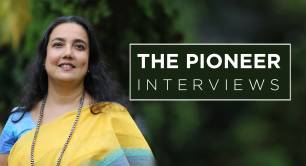‘Asian philanthropists do things differently’: why it’s wrong for ‘global’ conversations about impact investment to focus on USA and Europe
The problems of paternalism, why it’s insane to leave China out of the conversation, and the importance of listening to the grassroots – AVPN’s Naina Subberwal Batra urges the international impact investment community to learn from Asia in the run up to the AVPN Global Conference 2023.
Philanthropists in the USA and Europe should look to Asia for models of giving which are less paternalistic, more flexible and more equal, according to one of the region’s leaders in social investment.
As around 1,000 philanthropists, policy makers, social investors and others prepare to gather next week in Kuala Lumpur for the AVPN Global Conference 2023, Naina Subberwal Batra, CEO of AVPN, emphasised that discussions about philanthropy and how to meet the UN Sustainable Development Goals in Asia had global relevance.
- Read about AVPN’s 2022 Global Conference: Economic recovery must factor in voices of developing nations
“In Asia, we feel we are at a place where we can do things differently from how our counterparts in the West have done it,” she said. “We can benefit from their experience so that we don’t make the same kind of mistakes.
“Hopefully, we can move towards a philanthropy that is less paternalistic and less feudal in its outlook.”
Strategic philanthropy
With Asian wealth and philanthropy on the rise, Subberwal Batra, who was speaking to Pioneers Post this week from Singapore, highlighted that AVPN, Asia’s largest network of social investors, aimed to ensure that philanthropy across the region was strategic.
“That means having very clear goals and a clear mission, collaborating with stakeholders, having a clear monitoring and evaluation process that is arrived at in conjunction with beneficiaries, and really looking at working towards sustainability and longer-term impact,” she said.
This, she said, would help Asian philanthropy develop to be more flexible and more equal than that in the West.
While international investors in the global South had sometimes become involved without having a presence on the ground, Asian foundations and philanthropists would have “a deeper sense of the change that they want to see” and be “more sensitive and more open to discussions”, she said.
In the USA and Europe, philanthropy had traditionally taken place where governments needed to act, she said, and there had been concerns raised about whether the private sector was crowding out public sector spending.
Similar criticism also extended to questioning the motivation behind the private sector taking on this role, particularly the ultra-high-net-worth philanthropists who had made their money on the basis of the system. “Can they really be trusted to fix a system that has enabled their wealth?” she said. “What is the impetus behind their giving? Is it the tax breaks or the desire to really make a change? Are they actually ready to move the status quo?”
If you look at the large global gatherings, the conversation tends to be dominated by the US, Europe and, at the most, India
Asian philanthropists were different, she said, working with governments to strengthen what had already been provided by the state rather than creating new initiatives such as separate school networks or health systems. They aimed to bring their private sector expertise to support public sector infrastructure, rather than to supplant what governments were already doing.
“That’s a different way of approaching philanthropy and a different way of approaching scale than you normally see in the West,” she said.
“That’s why the West should learn from what’s going on here.”
‘India is not Asia’
Events such as AVPN’s were important, said Subberwal Batra, to hear the voices of the whole of Asia, compared with those hosted by organisations such as the Global Impact Investing Network (GIIN) and the Global Steering Group for Impact Investment (GSG).
“If you look at the large global gatherings, like the GIIN or the GSG, the conversation tends to be dominated by the US, Europe and, at the most, India,” she said. “India is not Asia, we need to keep moving east.”
Current global political tensions also meant that China was often left out of conversations.
“I think that’s insane,” she said. “If we’re talking about philanthropy and development, this is a country that has lifted 750m people out of absolute poverty. That’s a huge achievement. And by deciding that we’re not going to engage with them, we’re leaving a lot out.”
AVPN’s Global Conference next week, she said, would have good representation from China, in particular the China Impact Investing Network, as well as south east Asia.
What to look out for at the AVPN Global Conference 2023Discussions that the Pioneers Post team will be keeping an eye on:
|
‘Global Challenges: Asian Solutions’, AVPN’s Global Conference 2023, runs from 20-22 June in Kuala Lumpur, Malaysia. Pioneers Post is a media partner and will be reporting from the event.
Header photo of Naina Subberwal Batra, courtesy AVPN
Thanks for reading our stories. As an entrepreneur or investor yourself, you'll know that producing quality work doesn't come free. We rely on our subscribers to sustain our journalism – so if you think it's worth having an independent, specialist media platform that covers social enterprise stories, please consider subscribing. You'll also be buying social: Pioneers Post is a social enterprise itself, reinvesting all our profits into helping you do good business, better.



